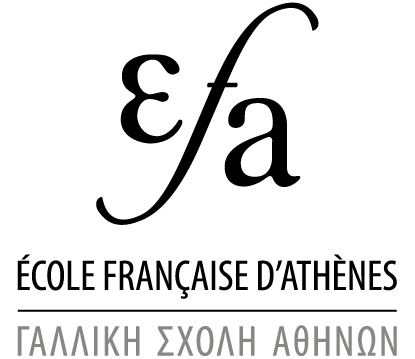Regards croisés sur…la ville

Athletic Facilities and Bathing in the Cities of the Western Mediterranean in the 2nd/1st Centuries BC
Monika Trümper Freie Universität Berlin
Respondent : Guy Ackermann École française d’Athènes
(Re)voir le webinaire / (Ξανα)δείτε το webinar
La thématique adoptée en 2022, pour la première édition de ce séminaire, porte sur la ville qui est ainsi examinée sous l’angle de l’artisanat, de l’urbanisme, du commerce ou encore des nécropoles. Tous les mois, un ou deux membres scientifiques invitent un.e expert.e à présenter des travaux en résonance avec leurs propres recherches en cours à l’EFA.
Les séances se tiendront le mardi à 18.00 sous la forme de webinaires et, dans la mesure où la situation sanitaire le permettra, dans la salle de conférences de l’EFA.
Le séminaire est organisé par les membres scientifiques des sections antique et byzantine et moderne et contemporaine de l’EFA.
Programme 2022 à venir…
Με τον κύκλο σεμιναρίων «Διασταυρωμένα βλέμματα…», που είναι επικεντρωμένος στην διαχρονία, τα επιστημονικά μέλη της Γαλλικής Σχολής Αθηνών και οι προσκεκλημένοι ομιλητές θα συνομιλούν γύρω από μια κοινή θεματική που θα είναι διαφορετική κάθε χρόνο. Η θεματική που έχει οριστεί για τον κύκλο σεμιναρίων που θα πραγματοποιηθούν το 2022 είναι « H πόλη »: η πόλη από την σκοπιά της παραγωγής, της πολεοδόμησης, του εμπορίου, των νεκροπόλεων. Κάθε μήνα, ένα ή περισσότερα επιστημονικά μέλη της Σχολής θα προσκαλούν έναν ειδικό ομιλητή για να συνομιλήσουν πάνω σε ένα κοινό ερευνητικό ζήτημα.
Οι διαλέξεις θα γίνονται την Τρίτη στις 18:00 και θα έχουν υβριδική μορφή (webinar και φυσική παρουσία αναλόγως με τα υγειονομικά μέτρα).
Ο κύκλος σεμιναρίων διοργανώνεται από τα επιστημονικά μέλη της Γαλλικής Σχολής Αθηνών (Διεύθυνση Σπουδών για την Αρχαιότητα και το Βυζάντιο/Διεύθυνση Σπουδών για την Νεότερη και Σύγχρονη Ελλάδα).
Πρόγραμμα 2022 προσεχώς…
Assistante administrative pour la Direction des Études
iokasti.kammenou@efa.gr
+ 30 210 36 79 958
Nolwenn Grémillet
Communication
nolwenn.gremillet@efa.gr
+ 30 210 36 79 943

